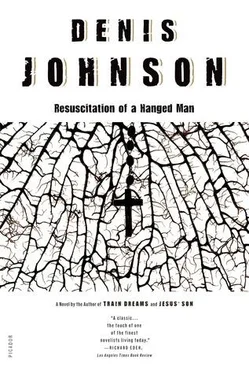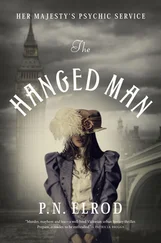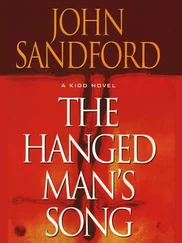Next to that cabin was a large outhouse of sorts, its door open and the hinges sprung not by an animal or by a person, but only by the snows that had drifted into the cracks and hardened, expanded, and been added to by further drifting.
Gerald Twinbrook hadn’t broken this door open, but he’d entered here. His knapsack and sketch pad and sleeping bag lay on the floor, candy wrappers scattered around them.
English sat down on the concrete floor, on the sleeping bag, and took a look at what he was sure must be Gerald Twinbrook’s last sketches.
The top sketch was a landscape, a study of the outcropping English had seen from farther down the road. He’d seen it from farther down, but it lay above the encampment somewhere. He turned the pages over. The next sketch was one of a gallows. Another of the outcropping, another of a gallows fixed to the outcropping. He knew the style, the stovepipe broken-necked figure hanging from its noose. With a few strokes Twinbrook had managed to give the hanging man a certain heft, an inertia implying movement.
Touching these pages, English’s hands were as steady as the artist’s must have been. All anxiety had left him. He was happy.
There was a sketch of the encampment itself, with a trail of animal tracks leading across the snow. And a sketch of a man laid out with a noose around his neck. He read Twinbrook’s note beneath it: Now we are allowed to take the dead man / and strike him with lightning of our own making / and bring him back to life.
Anything was possible, anything. English looked to the sky for lightning. Three large grey clouds in what he believed was the east; nothing more.
He decided to climb up around behind the distant outcropping and overlook the entire scene. He wished he had binoculars.
The road led nearly to the cliff, and then sidled right; English took a game trail left, a very steep one that eventually curved back right, not quite so steeply, and aimed straight at the head of the falls.
In ten minutes he was higher than the outcropping and somewhat behind it, looking down at the waterfall. The embankment leading down to the edge of the cliff was much steeper than it looked, and there wasn’t any path down that way. He left the path, sat on the earth, and let himself down the bank just a little at a time. But he wasn’t liking this. Even twenty meters from the ledge he felt nothing protecting him from the drop. He thought he might make it hand over hand, hanging on to shrubs and tiny trees, until he got close enough to see almost everything below, but he didn’t need to go even five more meters to be quite sure he’d made a mistake. His courage gave out and he froze, breathing too fast, his heart working in him like a toy. The cold mist from the falls wet his face. All the life in him seemed to have congealed beneath his throat, and he was completely without strength in his hands, arms, and legs. On top of everything, the outstretched vista lent a kind of infinitude to his vertigo, and now he panicked, certain that he’d be stuck right here until he died of exposure or slipped away, still completely paralyzed, over the edge and joined the waterfall. But he was relieved to discover that whatever else happened in his life, his hands were not going to let go of the sapling evergreen they’d attached themselves to like the talons of a hawk. And from the height of hawks he looked down the Franconia Notch out into the New Hampshire lowlands while the spirit leaked back into his extremities.
Well below but closer to him, on what might have been a trail leading out of the encampment’s perimeter, he caught sight of a patch of earth with a blue tint to it unlike the surrounding patches. The area he was looking at lay outside the shade of the mountain, and the green of the pines made it hard to say — he might be looking at a freshly fallen bough, more green than blue. From this distance, some several hundred meters, nothing about it was definite, and in fact the spot of blueness disappeared as he stared at it. He let go of his branch with one hand, as carefully as if he were releasing half his hold on life, and reached behind him toward another very fragile-seeming frond, starting the climb back up to the trail he’d come by.
Going down he felt no safety in the level of the path. As long as the ledge was below him, he felt sure he was about to go over it. On the wide level of the Forestry encampment his feet were firm, yet the meadow itself seemed to drift slightly, ready to submerge in a general precariousness.
There was indeed a trail out of the encampment, but he couldn’t say whether it led to the thing that had caught his eye. He moved down the path for a long time, in many places pushing sideways between the brittle shrubs, but he thought he must not be getting very far. The trail led onto a ridge that widened considerably, until he was well out of the mountain’s shadow. Apparently this ridge didn’t get much more daylight than the encampment, however, because the woods, and particularly the trail, were patched with snow.
Ahead was the bit of blue that had drawn him to this place — clothing; a man’s parka, in fact. The man was still wearing it.
English was dazzled by the golden light coming out of himself as he approached the body. It was the afternoon sun following him down the path. The woods were rotten and wet, like a wound reopened. Patches of old snow were pink in this light, deep blue where shaded. The thaw trickled and dripped nearby, and in the distances it cascaded, echoing.
A frozen man English took to be Jerry Twinbrook lay under a thick limb beneath a sugar pine. It looked as if maybe he’d been strolling along and the branch had broken off and hit him over the head. But his neck was leashed to the branch by a yellow nylon rope that bit deeply into the flesh. The flesh, English couldn’t help reminding himself, that God had made him out of. The branch must have held for a long time and then broken off when a bad freeze had made it particularly brittle. The snow had come and covered Twinbrook up, and then it had melted away. His eyes were gone, and the black sightless sockets made him seem impossibly alienated from his surroundings. He looked like a victim wasted by some horrible addiction that had finally blessed him with this death. Birds had eaten the eyes. It happened to everything that died in the woods. English went over these points as if explaining them to someone else. He took a deep breath. The air flooded him. The life’s blood gurgled in his fingertips. Suddenly his eyes burned, he felt sexy, and he wanted to take off his clothes and dance around, fondling himself and screaming. In a while he did exactly that; he tossed aside his garments, even his shoes and socks, and for a few minutes, until he got too cold, he pirouetted whitely through the woods, like the naked soul of Gerald Twinbrook liberated from the corpse.
English took a Yankee Flyer out of Franconia. As the coach of this obscure bus line dropped down into towns he’d never see but this one glimpse of, his vision dipped into his fatigue, dredging up brief dreams. Nobody sat down in the adjacent seat, not because he was obviously the kind of person nobody would sit beside on a bus, a person who’d slept in a chair and spent most of his money getting a jeep towed down a mountain, but because that seat was occupied by Gerald Twinbrook’s essence, or ghost.
English was in the back with the smokers, in this case a young lady of the hippie-gypsy type and a Georgia boy from an air base farther north; also a bony lad who asked English where he was from and then said, “They read you pretty good in Massachusetts?”
“I don’t exactly place your meaning,” English said.
“They read you deeply there, huh?”
Pretty soon the others were passing a pint bottle and singing “Ain’t No Mountain High Enough,” acquiring the luminousness of sleazy angels as the pink dawn struck their faces. The coincidence was appalling to English, but by now he was resigned to the fact that God was on him like a harpy, and was riding him toward his destiny, and wasn’t bothering anymore to veil the workings of His terrible hands. The light of mid-morning woke him and he got a clear look at Gerald Twinbrook, who lounged beside him with an innocent irony glowing out from deep in his excavated eyes. Across the aisle the gypsy girl and the Georgia boy were locked statuesquely in a drunken kiss.
Читать дальше












